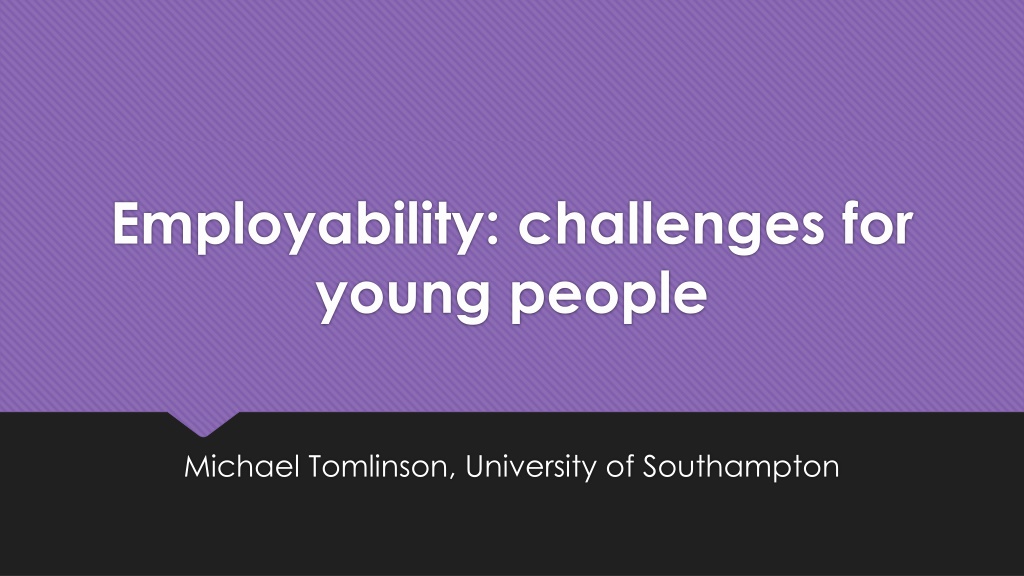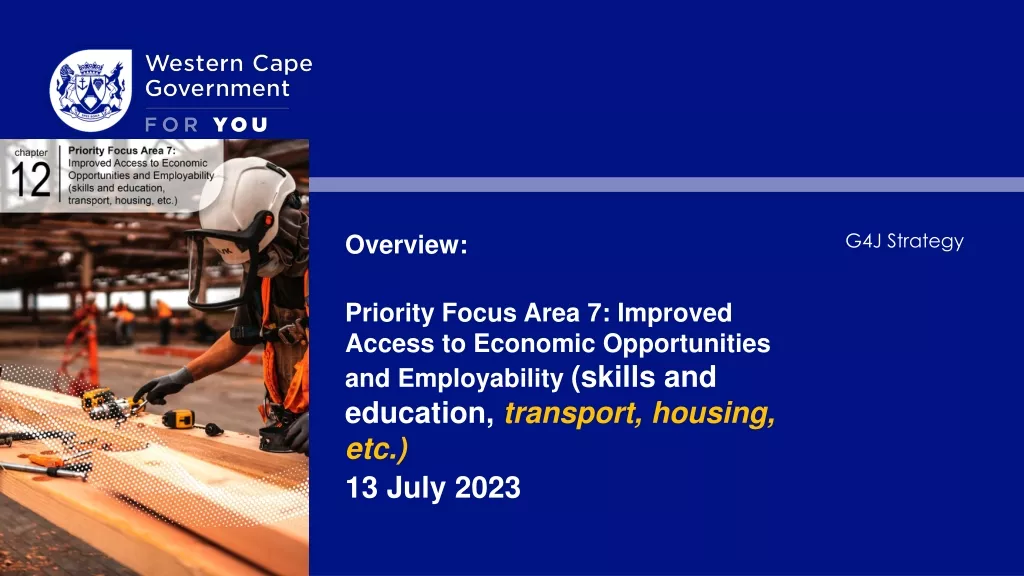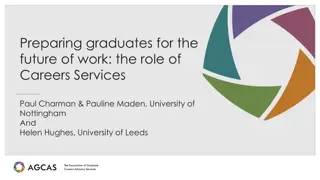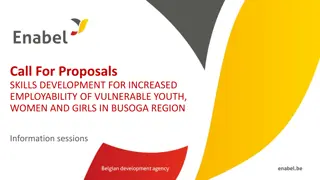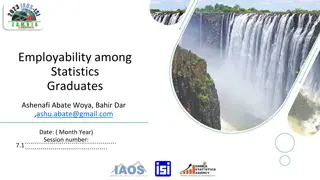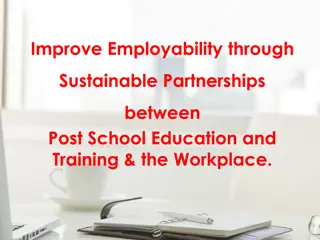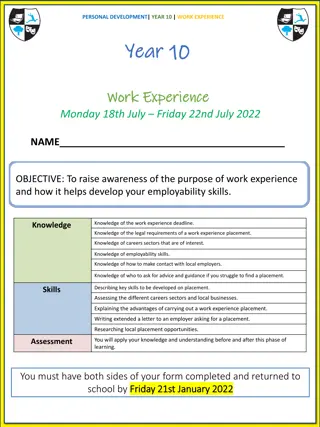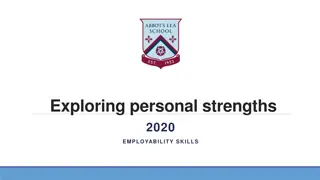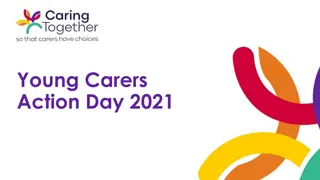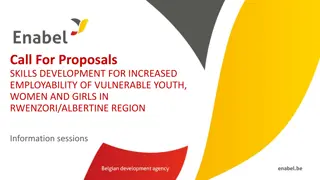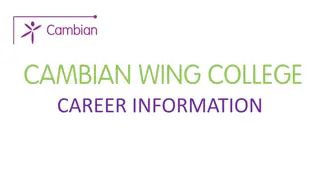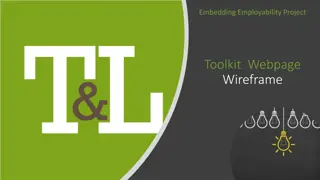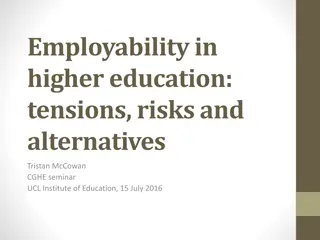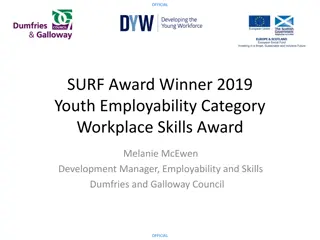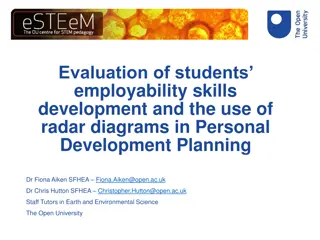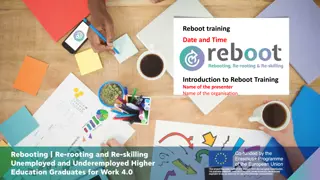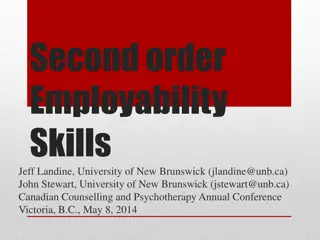Challenges and Definitions of Employability for Young People
The presentation delves into the challenges faced by young individuals in terms of employability, including transitions, delayed transitions, and varying opportunities. It explores the policy context surrounding employability, emphasizing the distinction between employability and employment. Definitions of employability are discussed as a complex mix of personal characteristics, career trajectories, and negotiations with the job market and employers. The importance of subjective factors in determining self-perceived employability is also highlighted.
Download Presentation

Please find below an Image/Link to download the presentation.
The content on the website is provided AS IS for your information and personal use only. It may not be sold, licensed, or shared on other websites without obtaining consent from the author. Download presentation by click this link. If you encounter any issues during the download, it is possible that the publisher has removed the file from their server.
E N D
Presentation Transcript
Employability: challenges for young people Michael Tomlinson, University of Southampton
Outline of the presentation The context of employability for young people Definitions and challenges to the concept Emerging evidence from HEFCE study on HE students
Employability challenge in young peoples transitions Delayed and extended transition the transition as a shock event School-leavers & graduates increased number and diversity; un- employment /under-employment (NEETs, GRINGOs) Academic/vocational divide, variable quality in educational experience and outcome Mass marketised HE cost transference, student-as-consumer Differences in resources and opportunity access Mediating factors - class, gender, locality, subject of study, educational biography
Employability and the policy context Supply-side orientation Employability as enhancement of human capital Preponderance of employability-as-skills discourse (emphasis on institutional employability) Raising of Participation Age But employability and employment are not the same thing
Employability definitions As individual's 'ability/propensity to find and maintain employment (personal characteristics) A complex mosaic (career trajectory, educational biography, economic context, serendipity) Employability as processual (recursive, interactive, biographical) Move to lifelong employment to lifelong employability (mobility, protean career structures) Negotiation between individuals, the job market and employers Absolute and relative dimensions (Forrier and Sels, (2003); McQuaid & Lynsey, (2005); Brown et al, (2003); Holmes (2013)
Subjective factors: self-perceived employability Perceptions of Internal and external factors (my own personal employability and how the market will receive it) Examples of core measures: My skills are sought-after in the labour market I believe I could easily obtain another job that would give me a high level of satisfaction If I needed to I could easily get another job like mine in a similar organisation Berntson & Marklund (2007), De Vos & Soens (2008) and Rothwell & Arnold (2007).
Key issues for employability research What employment outcomes are salient and how are they to be measured? How should we understand the nature of the relationship between education and employment? (supply) What do school-leavers and graduates do when they enter the job market and how do employers contribute to sustaining individuals employability (demand) Challenge to move beyond walled garden and folk wisdom approaches (including deficit narratives)
Evidence from HE sector: Learning Gain Higher Education Funding Council project (Evaluating Measures of Learning Gain ) Designed to explore what HE students gain from 3 years of university education Affordances of the HE experience, perception of benefits and areas of development Multiple approaches (self-theories, mind-sets, employment readiness) Portsmouth University, University of Southampton, Royal Holloway University, Roehampton University, University of Arts, London) Development of psychometric scale and student focus groups & interviews with employers (15) and academics (6 focus groups) Stage 1 (1,006 students surveyed so far)
Dominant forms of capital in employability and student development Human - formal knowledge and skills, career-building skills Social networks, relationships and weak ties Cultural cultural knowledge and confidence Identity self-concept and personal employability narrative Psychological resilience and career adaptability
Capital form Item example Application and utility in the labour market Practical implications I feel my knowledge and skills will be relevant for future employment I believe my degree will strongly enhance my prospect I have a strong network of friends and contacts who can help me find out more about job opportunities I have developed some useful contacts with employers during my degree Performance of required demands; Matching of qualifications to jobs Support subject knowledge; Promote career building skills Human capital Awareness and access to opportunity; structures, insider knowledge of jobs Development of bridging activities; Direct employer; Engagement/interaction Social capital I believe I will connect well with employers and fit into their organisation I feel I am able to perform well in the recruitment process Social fit; Favourable appraisal of potential; Integration into organisations Cultural awareness and Confidence building Cultural capital I invest much time and energy planning for my future careers I think a lot about future careers Career insight and proactive labour market engagement; Development of employability narratives Building and Manicuring CVs; Supporting pre-professional identity. Identity capital I feel confident I can bounce back from disappointing outcomes in the job market I feel I can adjust to change and uncertainty in the job market Adaptability; Flexibility; Malleable behaviour Expectations management; Contingency planning; Coaching in resilience Psychological capital
Employer perceptions: skills or capitals? Flexible specialism degree substitution Experiential advantage (articulating/demonstrating experiential value Importance of balance The three dimensions intellectual horsepower, drive, sociability Social fit and cultural acceptability Fluid boundaries between hard and soft skills (professional skills discourse, organisation-specific) Need for flexibility and career adaptability (enabling mindsets)
Employers: emerging evidence I think the one thing that makes somebody more employable is work experience. It s simple as that. I ve said this partly in jest over the last few weeks but if we mandated that every degree was a four- year degree and had to have either a one-year or two six-month placements, actually you d solved a significant number of the employability fit for work issues. But that s a bit tongue in cheek and it ll probably never happen, but the trick in that is that actually it s understanding how the world of work works. And when we get into the issue of employability it s very easy to come up with a list of skills and attributes but actually the understanding from being in work, knowing that stuff happens, knowing that you have to deal with changing environments I often talk about a transition from university to the world of work (Research & Development, Head of Graduate recruitment) So one of the worst examples of student given an interview and asked about teamwork is to talk about a group exercise at university, no matter how well it was done, no matter what the problem, because you have to do it, you re told to do it, you re told who to work with. So somebody who can articulate, and this is where the self-awareness comes in: here s this nightmare where you re just going to have to deal with it in a completely different context, but if you were doing something you weren t told to and you did it well and you did it with drive and motivation that s what shows a differential candidate (Research & Development, Head of Graduate recruitment)
Employers And what s interesting with some of these, sometimes you might find a person that is naturally resilient but in others, it takes all of us, myself included, longer to develop those things; you can only develop them over time. And maybe that leads me into my third question, which is to some extent your list of ten attributes, which everything you ve said I can see the sense of, it might be unlikely that any new fairly damp around the gills graduate who comes into an organisation would have them all (Sales and Customer Services, Head of HRD) So generally speaking, if people have worked in retails or in bars, as most people at university have, you re going to have that time when you ve had to push the side dish at a restaurant or push the bottle of wine when someone buys two glasses, or if you re buying a pair of jeans, That belt looks great with it as well, something like that, that s the level of competence with sales that we re looking for. We re not necessarily looking for hard and fast cut-throat salesperson, the stereotypical mobile phone sales person or the sofa sales person, that s not what interests us. We d rather have someone that s customer-focused and that can be taught to be provide value and provide the additional extras to the customers through selling useful products to them (Sales and Customer Services, Head of HRD)
Practical applications for guidance The importance of college leavers and graduates being able to access and articulate formal skills and experiences and present these as meaningfully applicable to target employment; The importance of students fully capitalising upon the multi-faceted offerings of the university experience. This includes building experiences and understanding and articulating their significance. The role of work experience is significant and clearly cuts across all the main forms of capital; The importance of students thinking proactively about themselves as a future employee and engaging in early career formation, either formally or more ideationally; The need for students to be anticipative of likely transitional and early career challenges and hurdles and to start working through strategies to negotiate these; The need for students to begin the process of employability development and emerging career formation fairly early into their higher education.
